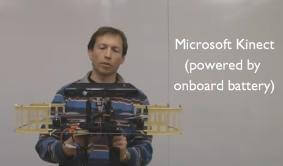
The Kinect 3D Sensor may be a robot’s best friend. Willow Garage recently sponsored a Kinect-hack competition for the open source Robot Operating System (ROS). Amateur and professional engineers from around the world competed to see who could create new, interesting, and fun uses for the Kinect 3D sensor. The ROS 3D Contest announced its winners today, with $9500 in prizes. (Not bad considering the Kinect only costs $150.) Among the entries and finalists are some really great examples of how the Kinect lets developers leverage a little ingenuity into some really cool applications. Of course, because ROS is open source, all of the code necessary for these unique project is now freely available to anyone. Pretty sweet. Check out videos of some of the most impressive entries below. Not all of them involve robots, but put together I think they show that the ROS 3D Contest was a big success.
The Tech University of Chemnitz in Germany decided to use Prime Sense cameras (the devices inside the Kinect) to give their quadrotor drone a little sense of altitude and some help navigating. Watch it roam the halls of TCU in the following video. The team took a PrimeSense Dev Kit 5.0 Award in the ROS 3D Contest.
Garratt Gallagher at MIT has been going apesh*t with the Kinect. I mean, seriously. Gallagher had six entries in the ROS 3D Contest! This guy has developed some well regarded hand and finger tracking systems, and even segued those into a great Minority Report style interface that we covered before. His “customizable buttons” application took first place overall. Check it out:
Another great Gallagher entry, and one that’s perhaps more suited to ROS’ robot theme, is this simple tracking program that turns any Kinect-enabled bot into a machine that loves to stalk humans.
Taylor Veltrop developed a skeleton tracking system with the Kinect that allows you to teleoperate a robot. We were really impressed when we saw it a few weeks ago. Since its initial debut, Veltrop has improved upon the system with some Nintendo Wii controllers and upgraded to using a Nao robot. Amateur developers from around the world have already started replicating Veltrop’s work using his code. It’s no wonder then, that he took third place overall in the ROS 3D Contest. It’s pretty cool to watch him command his Nao from the inside out:
Berkeley’s Hybrid Systems Lab had their own Quadrotor+Kinect combination that took second place overall in the contest. Not only does the setup allow the bot to know its altitude, it also enables some pretty simple obstacle avoidance:
Willow Garage and ROS handed out two Most Useful Awards, with first place going to students at the University of Freiburg. This team used the six dimensional Kinect sensor, some loop-closing code, and some SLAM know-how to produce really amazing looking 3D 360° panoramic images. Techniques like this could transform digital maps in the future – and for cheap! Rememer the sensor only costs $150, and this is all open source code.
The final video I want to show you comes from Alberto Jose Ramirez Valadez, Jonathan Rafael Patino Lopez and Marcel Stockli Contreras. They recreated the classic video game Lemmings using silhouettes generated with the Kinect sensor. Sure, video gaming is what the Kinect is meant to do so maybe this isn’t all that inspired. Still, it looks pretty fun. I wonder if we’ll see a bunch of user-generated games appear on XBox Live Marketplace in the years to come.
If you haven’t noticed by now, I’m a big fan of open source development and open source robotics in particular. While the code developed for open libraries may not always be as polished or powerful as proprietary software, its potential for building the robotics community is unparalleled. The code you share helps other developers produce innovations faster, which in turn they can share with you to advance your own work. Competitions like the ROS 3D Contest may not seem geared towards creating rapid improvements in the world of robotics, but I think that the interest they generate will eventually pay dividends for everyone involved. Piggy-backing on the Kinect-hacking trend was a smart move, and I hope that this competition will enable bigger and better endeavors with the Kinect and with open source robotics in general. If nothing else, they’ve provided me with a fun afternoon of light entertainment.
The official results for the ROS 3D Contest can be found here.
[screen capture credit: UC Berkeley HSL via pbouf77 ]
[source: ROS]


